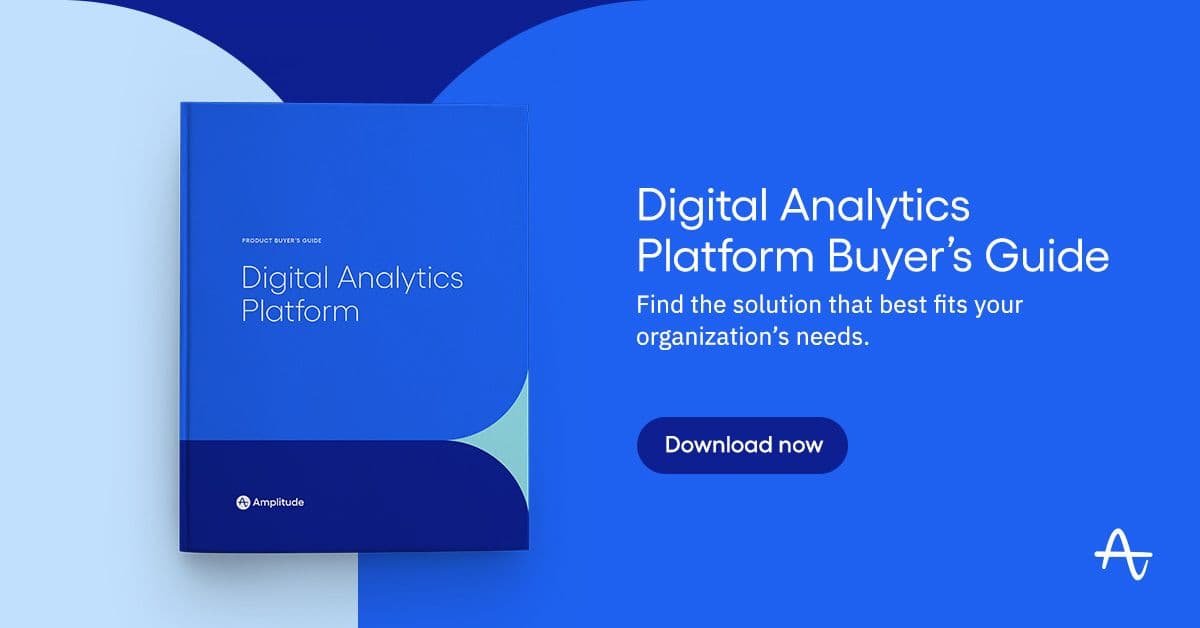Explaining Digital Transformation & Amplitude to My Family
How the experience of attending virtual religious services made the story of digital optimization all the more clear
Like many of us in the technology field, I have, at times, attempted to explain what I do for a living to my non-technical family, who, for some reason, think I am nothing but iPhone technical support! This usually ramps up as I start new jobs like I did recently when I joined Amplitude. At a recent family dinner, my family asked me what Amplitude did and what digital transformation meant. I tried to explain digital transformation and what being a digital-first organization meant by sharing some of the typical examples:
- Uber has upended taxi cabs
- AirBnb has put a dent into hotel bookings
- Twitter has taken mindshare away from newspapers
- Peloton has displaced local health clubs
I explained that the underlying theme in these scenarios is that new business models, powered by digital apps, made common tasks easier and more convenient for customers. For these “digital-first” companies, the business model wouldn’t work if it weren’t for the relatively new advancements in digital technologies (internet, phones, apps and cloud computing) that power these digital experiences. For example, Uber wouldn’t exist if you could only order a ride from a desktop computer. I also explained how the COVID-19 pandemic greatly accelerated this trend. Unfortunately, they still had questions, so I decided to try and explain digital transformation and what Amplitude does using the following hypothetical scenario to which I thought they could relate.
In-person Services Become a Digital Experience
I recently moved from Chicago to Pittsburgh. As part of this change, our family was no longer physically located near our local place of worship back in Chicago. But even if we were, we would likely not be able to attend religious services in person due to COVID restrictions. So when there was a recent religious holiday, our family “congregated” around the television set to watch religious services streamed over the internet to our phone and then air-played to the television.
What was most interesting about this scenario was that the services that we watched weren’t from a religious organization based in Chicago or Pittsburgh. Instead, through word of mouth (and Facebook), we (and thousands of others) heard about this service based in New York City that was streamed for free over the internet. Normally, where you worship is dependent upon where you live—you attend services at the appropriate religious organization closest to your home. But in this case, we attended services remotely at the same time as friends across the country. In the days that followed, we were able to talk to friends from multiple geographies about the messages we all heard from the same service and have interesting and meaningful conversations about it. None of this would be possible without the internet and the products built upon it.
I then played out a hypothetical scenario with my family, asking them to imagine this scenario extended out over the next few years. While religious organizations aren’t run like businesses (nor should they be), I used this anecdote to draw the connection to digital transformation. Imagine, I posed to them, that in the future this New York-based religious organization built a mobile app and offered a premium, paid membership so that members could attend services online. Their local constituents could still worship in person, but now, this new mobile app would open up their services to anyone in the world who wanted to attend. They would likely offer remote congregants an “app-only” membership at a discounted price. The always-on, always-connected mobile app could also be used to keep all members updated on news, events and to run donation campaigns. This would cover the costs involved in streaming services and likely bring in more money than ever before. Soon, other religious organizations would see what is happening and offer similar apps and services. People across the country would have multiple choices for where they wanted to worship and would choose based upon preference, their social group’s affiliation, price or more. Perhaps local churches, mosques or synagogues would transform into locales where congregants of these “virtual” religious organizations would gather locally. Maybe some organizations would see membership rise under this virtual model compared to previous in-person services.
Now, to be clear, I was not advocating for this scenario. I believe that there are real benefits for congregants meeting locally, being part of a community, knowing each other personally and supporting each other through life’s events. I only brought up this hypothetical example to my family to explain how quickly a digital transformation could occur, even in the most unlikely of organizational models: religion.
Once I had my family entranced in this hypothetical scenario, I took it further. I asked them to imagine how important the religious organization’s mobile app would be to its success. Money that would have been spent on the physical buildings in the past would likely be diverted to the mobile app, since that would be the primary touchpoint of the organization. The religious organization would devote more resources to improving the mobile app experience. I explained that at some point the mobile app would be indispensable to the organization. It would become important to use platforms like Amplitude to analyze how members are engaging with the digital product and see which app features are working and not working and what content and donation campaigns are performing well. As new improvements were made to the mobile app experience, the religious organization might use Amplitude to see if changes are increasing engagement and retention. For example, leveraging data, the religious organization could identify which types of activities lead to increased member engagement and which activities, if not performed, could lead to disengagement.
Eventually, they might want to use Amplitude to personalize the experience of users in the app and to recommend content that is most relevant to each congregant. For example, a member who engages with content related to the grieving process might be recommended similar content to help them through their experience. These recommendations could be used to group members with similar interests (cohorts) together, which could drive deeper experiences and connections. Over time, the organization could also use Amplitude to run experiments to test different features or content. This could enable them to try out new ideas or activities with a small group of members to see their reaction before making a mass change that members may not like. Before long, the religious organization would not only be a religious organization, but also a technology organization. For better or worse, it could transform the entire religious establishment.
That is the power of digital transformation enabled by the internet and digital apps. The best product/content/experience wins and those who cling to the old way of doing things can lose. And it can happen faster than you think. And since the mobile app is critical to success, a platform like Amplitude becomes critical to the organization.
Miraculously (pun intended), this religious example resonated with my family and, in the end, they told me that they understood what I meant by digital transformation and what Amplitude did. And then they asked me to help upgrade their phones and iPads to iOS15!

Adam Greco
Former Product Evangelist, Amplitude
Adam Greco is one of the leading voices in the digital analytics industry. Over the past 20 years, Adam has advised hundreds of organizations on analytics best practices and has authored over 300 blogs and one book related to analytics. Adam is a frequent speaker at analytics conferences and has served on the board of the Digital Analytics Association.
More from Adam





